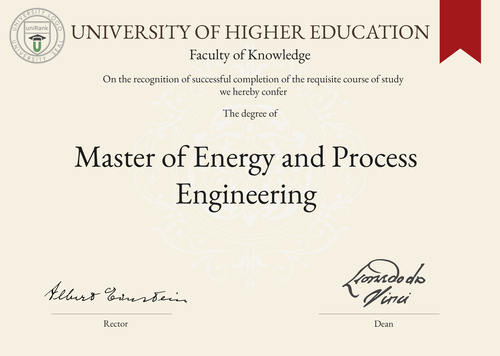
Master of Energy and Process Engineering (M.E.P.E.)
Guide to Master of Energy and Process Engineering Program/Course/Degree
Master of Energy and Process Engineering (M.E.P.E.)

Program Name:
Master of Energy and Process EngineeringProgram or Degree abbreviation:
M.E.P.E.Duration range:
The duration of the program typically ranges from 1 to 2 years.Tuition range:
The tuition fees for the program vary depending on the chosen country and university. Please refer to the respective university websites for specific information.Overview:
The Master of Energy and Process Engineering program is designed to provide students with a comprehensive understanding of energy systems and processes. It focuses on the efficient utilization of energy resources, sustainable energy production and the optimization of industrial processes.Curriculum Overview by year:
The curriculum is structured to cover both theoretical knowledge and practical skills. The program typically includes courses in thermodynamics, fluid mechanics, heat transfer, renewable energy systems, process optimization and environmental impact assessment.Key Components:
The key components of the program include advanced studies in energy systems, process engineering and sustainable energy technologies. Students also have the opportunity to engage in research projects and gain hands-on experience through internships or industry collaborations.Career Prospects:
Graduates of the Master of Energy and Process Engineering program have diverse career opportunities in industries such as energy production, consulting firms, research institutions and government agencies. They can work as energy engineers, process engineers, sustainability consultants, project managers, or researchers in the field.Salary Expectations:
The salary expectations for graduates vary depending on factors such as the country, industry and level of experience. Generally, professionals in the energy and process engineering field earn competitive salaries. For a more accurate understanding of salary expectations, you can utilize the Job Sites Search Engine, from our sister site jobRank, which searches over 4,600 job sites worldwide. Make sure to specify not only the job title but also the country you are interested in.Conclusions:
It is important to note that the program duration, tuition fees, curriculum, key components, career prospects and salary expectations can vary based on the chosen country or location to study the program, as well as the chosen university. Prospective students are advised to research and compare different universities and countries to find the best fit for their academic and career goals. Furthermore, visitors interested in pursuing a Master of Energy and Process Engineering degree can utilize the uniRank World Universities Search Engine to explore universities worldwide that offer this specific degree. This search engine provides a comprehensive database of universities, allowing individuals to find relevant programs in their desired location.World Universities Search Engine
search for Master of Energy and Process Engineering (M.E.P.E.) and add the Location (country, state etc.) or specific University you are interested in studying at.
Query examples:
- Master of Energy and Process Engineering (M.E.P.E.) United States
- Master of Energy and Process Engineering (M.E.P.E.) United Kingdom online
- Master of Energy and Process Engineering (M.E.P.E.) Australia international students
- Master of Energy and Process Engineering (M.E.P.E.) University of California
- Master of Energy and Process Engineering (M.E.P.E.) University of London tuition fees
- Master of Energy and Process Engineering (M.E.P.E.) University of Sydney scholarships
Share Program/Course
Interesting? Share this program/course/degree info with your friends now.